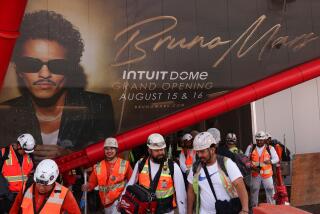TRUMPETER CAMERON AIMING FOR TOP AGAIN
- Share via
SAN DIEGO — Local jazz fans might remember 1980 as the year trumpeter Bruce Cameron seemed to be riding a high-powered rocket to the stars.
In his wake were two very hot albums, highly praised by jazz critics all over the world. And just ahead of him was a string of club dates in Los Angeles, Las Vegas and Atlantic City that would add fuel to his fire.
Jazz fans might also, however, remember 1981 as the year a sad and disillusioned Cameron fell back to earth, his fuel burned up in a flash of collapsed deals and broken promises.
Only in January, Cameron said, did he finally get the nerve to quit the enormously successful lounge band he had had for five years and form a new recording group: the Bruce Cameron Jazz Ensemble, built around five stellar local players and intent on regaining the momentum Cameron lost in those gray days of 1981.
“For a while, I enjoyed the club thing. It was simple and secure, especially after everything I had gone through in pursuit of a national career,” said Cameron, 41.
“But now I’m anxious to do something bigger again, something more than just be No. 1 in the San Diego nightclubs. So when people tell me I was crazy to walk out on San Diego’s most popular jazz band, I just smile.
“It’s just too hard to tell them nightclub success doesn’t mean anything to me, and that I’d rather start over, with a new band and a more traditional, acoustically oriented jazz that’s not at all suited for the big noisy rooms I used to play.”
Cameron’s strange and terrible adventure in the jazz world dates to 1978, eight years after he first came to San Diego from his native New York as a member of the Navy Show Band.
After his discharge in 1972, Cameron said, he led a double life: by day, he worked as a social worker for the county Public Welfare Department; by night, he played trumpet with such groups as the Charger Band and the Fox Theater pit orchestra.
In 1976, Cameron recalled, he finally made his debut on the local jazz nightclub scene. And within two years, he had quit his day job and become a full-time musician and band leader.
The time came for his next step, sending out demonstration tapes of his work to jazz labels hoping to land a recording contract.
Within months, he got one, a two-album deal with Discovery Records of New York, one of the most prestigious, albeit tiny, jazz labels in the country.
His first album, “With All My Love,” received four-star reviews and was also deemed “pick of the week” by all three leading music trade periodicals of the time: Billboard, Cashbox and the now-defunct Record World.
“But still, the album didn’t make the charts as I had hoped it would, and I blamed Discovery for that,” Cameron said. “They weren’t prepared for the success it had in terms of air play and critical reaction, and as a result they weren’t able to finance proper promotion and tour support.
“That got me mad, so I blew my contract with them the moment what seemed like a better offer came along. But as things turned out, I now wish I never had done that.”
The supposed “better offer,” Cameron said, came from veteran jazz producer Carroll Coates. Coates brought with him a whole string of impressive credits. He had written the music for more than 25 major Hollywood films and produced several albums for Frank Sinatra and other leading jazz vocalists.
“Even more importantly, he promised to market the finished record to major labels that could, in fact, provide me with all the support Discovery couldn’t--and thus, I felt, virtually ensure a smash,” Cameron said.
“Unfortunately, however, that’s not what happened. As soon as the record was finished, Coates told me he wanted to release it on his own label, Jazzworks Records, which he was just then in the process of putting together.
“And even though I and everyone else working with me on the project argued against it, he insisted--and we all went down together. Not only was there no money for promotion or tour support, but there wasn’t even national distribution.
“As a result, the album was doomed from the start. No matter how much air play I get, no matter how many club dates I play in places like Los Angeles, Las Vegas and Atlantic City--if the people can’t buy the record, it’s not going to help me.”
Disillusioned, Cameron returned to San Diego after less than a year on the road and immediately began recording and sending out demo tapes. But there was little interest, Cameron said, perhaps in part because word had spread of how he had broken his contract with Discovery.
As a result, he formed a brassy ensemble with former sideman Hollis Gentry and, for the five years that followed, enjoyed growing popularity on the local lounge front.
In the fall of 1984, however, Cameron had had enough. “Pop-jazz was no longer what I wanted to play. I wanted to get serious again.”
So he left the band--now known as Fattburger--at the height of its popularity and, for a year, sat low. He started his current band in January.
“So now, I’ll hopefully be able to take up where I left off,” Cameron said. “Sure, right now I need club dates to make a living, but I’m really not busting my butt to get them.
“The future for this band lies in recording, and that’s what we’re going to get into the second I think we’re ready.”
More to Read
The biggest entertainment stories
Get our big stories about Hollywood, film, television, music, arts, culture and more right in your inbox as soon as they publish.
You may occasionally receive promotional content from the Los Angeles Times.










